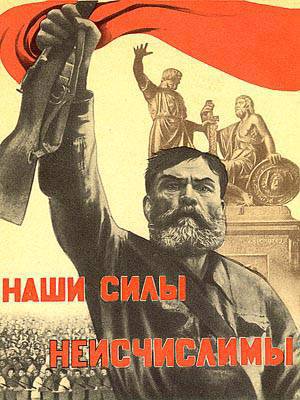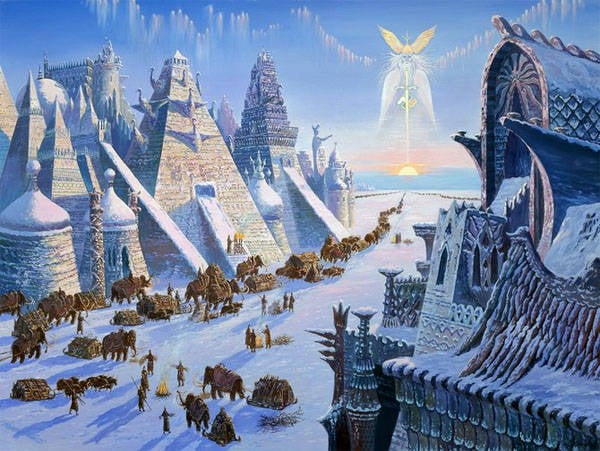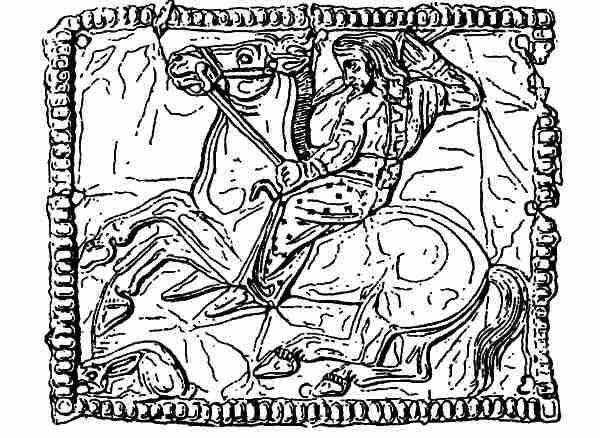Historiosophy of Victory
 Russia once again celebrated the Great Victory Day, which this year turned out to be on the Bright, Easter Week. It is symbolic to the highest degree that Berlin itself was taken on 6 of May, just at Easter and on the Day of St. George the Victorious. And this best of all shows - on whose side was the Truth, whom celestial forces supported. (By the way, the Victory Day itself is often called the Soviet Easter.)
Russia once again celebrated the Great Victory Day, which this year turned out to be on the Bright, Easter Week. It is symbolic to the highest degree that Berlin itself was taken on 6 of May, just at Easter and on the Day of St. George the Victorious. And this best of all shows - on whose side was the Truth, whom celestial forces supported. (By the way, the Victory Day itself is often called the Soviet Easter.)All this again prompts to think about the deeper meaning of Victory. And this is not only about the victory of the Forty-Fifth Year. Russian Victory has its metaphysical dimension, and its roots go back not even centuries, but millennia. All story Russia-Russia and its predecessor states is the history of victory over the world, which, according to the Gospel, lies in “evil” (evil here is not the creation itself, not the world itself, but its condition).
From the point of view of world elites, Russia is a kind of civilizational, geopolitical "misunderstanding." Such a civilization simply should not be, because it introduces a huge gap in the fabric of the whole world and Eurasian space. Something that is fundamentally different both from the “developed”, “central” West (Europe), and from the “underdeveloped”, “peripheral” East (Asia) is constantly being created here. Elites have always seen and continue to see the world as the interaction of the dominant center and the suffering periphery. The western center, in this optics, is called upon to suck the blood of the majority of the world’s population, representing a kind of universal vampire. However, Russia-Russia and its preceding pro-Russian entities have always failed in this vampiric program, breaking the chain of “slaves and slave owners” by the northern civilization, which is not similar to either the West or the East. Therefore, world elitist have long been sentenced by Russia and have repeatedly tried to bring it to the test. One of such attempts was the Hitler invasion, which, of course, should be considered the result of the activities of all world elites. First of all, here it is necessary to recall that the real brown international attacked Russia, uniting not only Europeans, but also immigrants from other countries. But one should not forget that the Anglo-American financial capital has raised the Nazi party. And the Western democracies themselves indulged Hitler until the autumn of 1939, pushing him towards such a coveted campaign to the East. By and large, all the world elites, both “fascist” and “anti-fascist”, played against Russia.
But what is so terrifying and angry about the world elitist our Russia? The fact is that it is in many ways not of this world ("lying in evil"). Russia is on earth, but it itself symbolizes the lost heavenly paradise from which people were expelled. And it is not by chance that supporters of the creation of the communist “paradise on earth” won for the first time in Russia. Of course, the return of land to heaven is a utopia, but the very commitment of this utopia speaks volumes. As for the lost paradise, but it cannot be revived, however, it is possible to structure the space that symbolizes the abandoned heavenly homeland. (In the perspective proposed by Orthodox theology, it is possible and even necessary to deify a person, to connect him with the uncreated energies of God. But this is a different, transcendent perspective.) And it was not the territory of Russia-Russia that created this space for many centuries and millennia. One of such project attempts was the religious-state formula “Moscow is the third Rome”. Here Rome was understood not as imperialism of the Roman type itself, but spiritual, first Christian Rome — the very one on whose lands Christ was born. The third Rome was thought of as a space that remained faithful to Orthodoxy, as a kind of sacred land that preserved "heavenly", "angelic" piety.

However, the roots go even deeper. The ancients kept the memory of Hyperborea - the great northern continents, which was inhabited by people of the golden (heavenly) century. The loss of Hyperborea itself and the departure from the originally-time frame of this century was viewed as falling out of paradise, the loss of the original fatherland. At the same time, the lost Hyperborea was constantly reproduced in various state-political formations, symbolizing the original Nordic continent. One of these sovereign symbols was Scythia, the heir of which is Russia (Russia).
The Hyperboreans themselves were either identified with the Scythians, or presented as a nation that borders Hyperborea in the north and directly receives from it all the sacred gifts sent to Greece on the island of Delos. They were intended for special admirers of the sun god Apollo - the patron of the mysterious northerners. The story of the Greek Yamblich about the disciple of Pythagoras Scythian Abaris, who was a resident of Hyperborea, is very characteristic. Here Scythians and Hyperboreans are unequivocally identified.
The version of the identity of the Hyperboreans and Scythians (Herodotus also defended her) is unlikely, or rather, the presence of such a nation as hyperborea in the ancient times. Indeed, it was hardly possible that people who did not know sorrow and were not subject to death from old age could live, and it was precisely these qualities that ancient authors endowed with Hyperboreans. These qualities are more suitable for the people of the Golden Age, which different traditions considered the time of the initial power, close to heavenly. Describing the wonderful life of the Hyperboreans, their aerial flights and copper rains, the Hellenes in a certain way overcame the longing for human perfection that was lost “during it”, attributing this perfection to the supposedly real northern people. But the fact that it was precisely the Scythians who were most closely associated with this people is very significant.
The patron saint of the Hyperboreans was sunny Apollo, whom the Slavs knew as Dazhbog - the Russians themselves called themselves the “dad's grandsons”. And here is another, amazing coincidence - it was Apollo who patronized Aeneas, and none other than Apollo declared his patron to the Roman emperor Augustus, from a lineage of which Rurikovich originated.
The “Hyperborean-Scythian” theme migrated to the Byzantine tradition. Thus, the Byzantine author Themistius wrote: “We populate the middle space between the Arctic belt close to the North Pole and the summer tropical, with the Scythians Rus and other Hyperborean peoples living closer to the Arctic belt ...”. As for the identification of the Scythians and the Rus, it was a common place. The Byzantine authors - Zonara, Skilitsa, Kedrin, and others. They call the Ruses Scythians and Tauroskifs.
The connection between Russia and the northern, Apollonian tradition was often emphasized. In a letter to Portuguese King Juan II of 14 July 1493, a pundit from Nuremberg, Jerome Munzer, wrote about some kind of northern community. There, “the Germans, Italians, the Ruthenians and the Apollonian Scythians, those who live under the stern star of the Arctic Pole, praise the Grand Duke of Moscow for the fact that several years ago under the stern star it was discovered the large island of Greenland (Grulanda), stretching along the shore of three hundred lay down on which is a huge settlement of people under the authority of the named Prince. "
There is an opinion that Munzer writes ... about America. “Pay attention to the fact of mentioning the size of the“ big island ”-“ three hundred lay down, ”notes eakonapev in her LJ blog. - We are talking about the coast of America, because one Portuguese leg is equal to 5 km. Münzer was a scientist, he wrote to the king, therefore he could not be mistaken. ”
As we see, Russia and then is associated with Scythia and with the Hyperborean Apollo (Dazhdbog). This is an archetypal connection that stretches over the millennia. Well, and, of course, it is characteristic that some Germans and Italians praise the Russian Sovereign, being in the composition of a single community with the Russians. This is the past, but it is also the future. In the future, the healthy forces of the West will undoubtedly enter the orbit of Russian civilization.
Through the millennia, and the confrontation of two huge branches of the once united Indo-European pragmatism. Linguists claim that even during the period of Indo-European unity, there were two language zones - the South-East and North-West. They are also called the zone "Kentum" and "Satam" - from the words that mean the numeral "one hundred" in each group (Latin centum and Avesta satém). The first belonged to the ancestors of the Slavs and Indo-Iranians (as well as the Balts, Armenians, Tokhars and Anatolians). The second consisted of the future Germans, Celts, Italians and Greeks. Obviously, Scythia and Russia inherited the YuVZ, while Rome, Hellas and Europe - the SPZ. It was this archetypal division that gave rise to a great confrontation that lasted (and lasts!) For thousands of years, now smoldering, now flaming up. Carriers Satam - the ancestors of the future Scythians and Russians - in 5 thousand BC. er formed a grandiose Srednestogovskaya culture, spread out over the vast spaces between the Dnieper and the Volga. Srednestogovtsy were farmers and herders, and they were the first in the world to tame the horse, which was the most important contribution to human culture as such. In addition, the Slavic-Indo-Iranians invented the wheel, which was another major turn in a person’s life (his most ancient images are found in the “Middle-aged” Stone grave near Melitopol).
The presence of cavalry allowed srednestogovtsy carry out large-scale expansion in different directions. So, srednestogovtsy invaded the Balkans, whose population did not know horses - this is evidenced by numerous items of srednestogovskoy culture found by archaeologists. Along the way, they defeated the powerful enough Tripoli culture, apparently belonging to Kentum. It is even possible, with a certain degree of caution, to assume that the confrontation of the Middle Eastern people and Western cultures is reflected in the Mahabharata, which tells about the clash of the Pandavas and the Kauravas. The standoff itself dates back to 4 millennium BC. Oe., when the Aryans were not yet in Hindustan. Expansion was carried out to the east - there the Slavic-Indo-Iranians reached the Volga, as a result of which the Khvalyn culture was formed.

On the basis of the Middle-Aged culture, later cultures emerged - Yamnaya, Catacomb, Srubnaya. All of them occupied large spaces, the unification of which could not have been possible without a complex political and social structure (for example, “yamtsy” settled lands from the Urals to the Dniester, and from the Caucasus to the Middle Volga region). Ancient sources keep deaf mention of these nameless empires, linking them with later Scythians. Pompey Trog wrote that the Scythians had dominion over the whole of Asia three times. The first period lasted one and a half thousand years and "Assyrian King Nin put an end to the payment." This data is confirmed later by the 5 historian. n er Pavel Orosy: "For 1300 years before the founding of Rome, the king of Assyria Nin ..., rising from the south of the Red Sea, in the far north, devastated and subdued Evksinsky Pont." “Comparing the dates (the founding of Rome - 753g. BC), we can assume that the Scythians dominated Asia in 36-21вв. BC, that is, in the early Bronze Age, - says historian N. V. Vasilyeva. “But this time is the period of Yamna culture and its immediate predecessors, the time when the arias of the southern Russian steppes settled in all directions to the south, creating new kingdoms!” (“Great Scythia”)
Over time, a single community of Satham was divided into Slavs, Iranians and Indo-Aryans. The latter, for the most part, retired in the direction of Hindustan, where they created a great Aryan civilization. Part of the Iranians also went to the south, where another great civilization arose - Persian-Iranian. The Slavs mostly remained on the former lands, where they created the great state-political formations on the Dnieper River - later all of them was Kievan Rus known to all. The ancient Greek historian Herodot writes about Scythian farmers (plowmen), whom many historians (in particular, academician B. A. Rybakov) identify with the Slavs, separating them from the Iranian-speaking Scythians-nomads (nomad). They built large settlements, practiced arable farming and highly developed craft. In 1 millennium BC. er it was the Scythians-farmers who became the state-forming people of Scythia, who united (like the future Russian) most diverse peoples - Iranians, Thracians, etc.
The Scythian Empire fell under the blows of the nomadic eastern hordes of Sarmatians in 3 c. BC er However, at that time her power was severely undermined by invaders from the West - the Celts, the carriers of Kantum. Few people know about this - the story is often silent about the great wars and great empires. For example, how many people are aware of the archaeological culture of the fields of burial urns, which can be attributed to Oriental, Scythian cultures? It originated in 13 c. BC e., and for several centuries spread in the vast space from the Danube to the Pyrenees and the North Sea. Its carriers reached the British Isles, where they left their mark on the local culture. It is significant that the Irish (Celtic) saga of Goidel Glas (Goidel Green) tells about the long-standing migration of ancestors from “Scythia”. Or take, for example, the famous megalithic monument Stonehenge - according to established legends, it was built by Scythians. Moreover, experts believe that this structure has a “pre-Celtic” origin.
And what about the Celts? They began their grand expansion later, faced with the Scythians. Especially this confrontation escalated in 6. BC e., covering Central Europe. And already in 3 c. BC er the Gauls broke through the Carpathians, seizing the land, which is now called Galicia (symbolically, given the Galician “Ukrainian” nationalism, isn’t it?). They were not allowed to go further, but they still weakened Scythia, which, in many respects, led to its fall under the blows of the Sarmatians. It turns out that once the whole of Europe was inhabited by our ancestors - the Scythians. And only then we were ousted from there by the then Europeans, among whom are the Celts. About the confrontation of the latter with Rome, anyone knows, at least some diligent schoolboy. (At least, he knew - until the collapse of the education system.) But the centuries of the Scythian-Celtic wars remained a grand “white spot” of ancient history.
Meanwhile, the tradition of confrontation has not disappeared anywhere, and continued at a later time (an outstanding "episode" is the struggle of the Scythian-Slavs against Rome, but this is a topic for a separate, very large conversation). One of the beacons of Italian humanism, Petrarch wrote at one time: “A crowd of strange people and women flooded the beautiful city with their Scythian faces, just like a transparent river is stirred up by a violent stream. And if the crowd didn’t like this, the buyers were more than me, if they didn’t delight their eyes more than mine, the ugly people would not fill the narrow streets, wouldn’t hit the visitors who were used to the beautiful faces, and in their Scythia, along with Hunger and pale, in a field covered with stones, where Nazon places it, to this day would have torn scrawny herbs with his nails and teeth ... ”
“Scythian snouts” are our ancestors, the Slavs, the Russians, who were enslaved by the “enlightened” Europeans. And the attitude to them of this "light" is very significant. It was such as before Petrarch, when the same enlightened inhabitants of the ancient world spoke disdainfully about the Scythian “barbarians”. It will be so after the great humanist, when the Gallic armada of Napoleon and the Teutonic hordes of Hitler march onto the Russian lands. The victory over the latter was the great Victory of Russia over the "world lying in evil." The next reincarnation of Scythia - the Soviet Union - showed that "people from this world" can not be destroyed. Their temporary defeats are only components of the inevitable Victory.
Our Victory.
Information